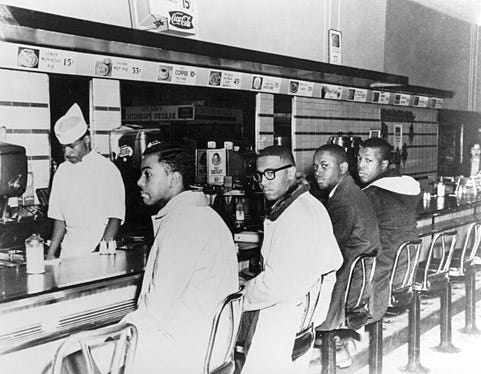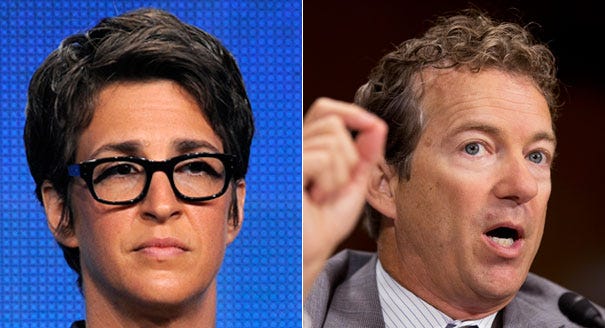Rand Paul’s No “Libertarian,” He’s a Politician
Anyone who thinks the Senator from Kentucky has principles needs to re-evaluate that thought.
Rand Paul’s announcement that he is running for the Republican nomination for President is leading many commentators to dub him the “libertarian candidate” of 2016. Paul has assumed that mantle in a somewhat paradoxical primogeniture from his father, former Representative Ron Paul.
Is Rand Paul a real libertarian? It’s a question you’ll hear many variations of the answer to in the next few weeks and months. Many commentators on the left are already attempting to paint Paul as an authoritarian wolf in sheep’s clothing by pointing out the inconsistencies in his ideology and his record in the Senate. His defenders point to his opposition to the surveillance state and his support of medical marijuana to counter these accusations.
I’ve never put too much stock in Rand Paul’s claims to libertarianism. The reason for this is the notorious interview the then future Senator had with Rachel Maddow on May 19, 2010 and his reaction to the immediate fallout.
Paul likely thought Maddow’s program was a safe place for him to appear; after all, he had launched his campaign for Senate a year prior on the very same show. In a way, doing The Rachel Maddow Show the day after defeating the establishment candidate in the Kentucky Senate Republican primary was a victory lap.
Unfortunately for Paul, the fact that he was now a bona fide candidate and not a long shot on the fringes of the Republican Party made him an appealing target for MSNBC. Paul’s statements on the Civil Rights Act, and how that law blurred the lines, as he saw it, between business and government made for a good opening for Maddow to paint him as an unrepentant racist dressed up as a libertarian. For a clear look at this line of reasoning, watch here:
There is an argument to be made along libertarian principles against the justifications for the Civil Rights Legislation of 1964. This argument goes something like this: Segregation was a disgusting racist legal framework. Nobody with any moral fiber would patronize a business that perpetuated it. However, the government did not have the right to impose morality by instituting an overarching federal law to desegregate by force. The states should have been left to their own devices to fix the problem.
The merits aside, the position is not complex. The argument is pretty straightforward. As far as libertarian principles are concerned, the federal government should not presume the right to interfere with how states treat their citizens re segregation. I don’t agree with the argument here, but I understand it. It does make a certain amount of sense and it is consistent with the libertarian principles espoused by Rand Paul.
Unfortunately, Rand Paul couldn’t bring himself to have ideological consistency on this issue. And that is what my skepticism on his libertarianism is grounded in.
If Rand Paul had answered the charges Rachel Maddow was making about his previous statements on the Civil Rights Act it with an assertion of his libertarian principles, that would be one thing. If he had invoked the principle of the magical hand of the free market fixing the sins of segregation through public morality and the economic upside of abolishment, that would be at least ideologically consistent.
But Rand Paul did none of these things. Instead, he prevaricated under the pressure of being asked about his position on a (at the time) almost fifty-year-old law. Eventually, Maddow backed him into a corner and he weakly asserted his support for Civil Rights Legislation while condemning the provisions that dealt with the behavior of private businesses.
If this were the end of it, there wouldn’t be much of an issue. Rand Paul would be another libertarianesque candidate whose positions on some points of policy, like civil rights, would be contested on the grounds of being distasteful. But that wasn’t the end of it.
The day after his disastrous interview with Maddow, Rand Paul released a statement designed to counter allegations of racism that were being levied by his opponent in the Senate race. Here is the part of the statement that undermines his claims to be a libertarian:
“Let me be clear: I support the Civil Rights Act because I overwhelmingly agree with the intent of the legislation, which was to stop discrimination in the public sphere and halt the abhorrent practice of segregation and Jim Crow laws. As I have said in previous statements, sections of the Civil Rights Act were debated on Constitutional grounds when the legislation was passed. Those issues have been settled by federal courts in the intervening years.”
Here’s the problem. Rand Paul may agree with the Civil Rights Act in spirit all he wants. He can assert that his only contestation with the act is its murky Constitutional validity. But what he cannot do is wriggle out of the responsibility he should have for his principles and positions.
It should not be the end to the conversation that the question of Constitutional legitimacy of the Civil Rights Act has been settled by the courts- that’s not a solution embraced by Paul on abortion, for example. The Civil Rights Act, for good or bad, was the federal government stepping into the affairs of the states and handing down a decree as to how they should conduct themselves. This is not consistent with the small government ideology of the libertarian.
If Rand Paul can’t even take a principled position on a law passed fifty years ago and stick to it, why should anyone consider him a libertarian? No matter how you feel about said position, the fact is that holding it on principle in the face of criticism would show some ideological consistency and backbone. Abandoning a position because of the problems inherent in holding it is not the sign of a principled politician.
Libertarianism is not the mainstream in the United States and its principles take work to uphold. Rand Paul has proven that when the going gets tough, he won’t stick with those politically problematic positions. His interview with Ms. Maddow just five years ago, and his immediate reaction to the political fallout from that interview, show conclusively that he is a politician first and a libertarian second- if he’s a “libertarian” at all.






